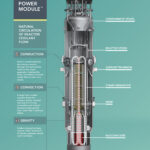
By Steve Haner
A Virginia Senate committee voted Monday to approve a House of Delegates bill designed to finance a small modular nuclear reactor in Southwest Virginia, contradicting its own earlier vote for a much broader bill that had statewide application.
Two different bills on the same topic might now pass the Virginia Senate. If the House does the same thing with the Senate bill, now alive in front of its Labor and Commerce Committee, Governor Glenn Youngkin (R) could have two very different bills to choose from.
“We don’t give the Governor two choices and let him figure it out,” complained Senate Majority Leader Scott Surovell, D-Fairfax, “It’s our job to figure it out.” But his motion to take the previous Senate language and conform the House bill to the Senate version failed on a voice vote. The bill was then approved 9-6.
When the House and Senate have different bills on the same subject, what usually happens is what Surovell wanted. The two sides insist on their own versions and put the bills into a conference committee to work out a compromise. Or the patrons and lobbyists huddle and work out the differences and bring forth a substitute to present before the Assembly adjourns.
The push to pre-finance a nuclear plant in advance of a formal decision to actually build it is one of the more interesting energy issues remaining at the 2024 session, and the previous stories are here and here. Asking ratepayers to pay for a plant that has not been approved as necessary, reasonable and prudent by the State Corporation Commission, and which may or may not be built at all, is an unprecedented departure from normal procedure.
Both bills are guilty of that abdication of ratepayer protection, but of the two the House version is the less problematic. The House bill applies only to Appalachian Power Company, allows for far fewer advance costs to be imposed on its ratepayers, and does not apply a profit margin to the pre-approval spending.
The Senate bill covers both utilities, meaning there could be two such speculative projects in two different state locations, with the ratepayers of both on the hook. It covers more of the advanced costs and mandates a profit margin. And it would allow the project to get further along before the utility – and it would be the utilities’ choice 100% — decides whether to proceed or abandon the plan.
“The SMR dog won’t hunt but it sure will bite,” complained one opponent, who drove up from Southwest Virginia to testify in person. Recalling his earlier testimony on the Senate bill, his objections are to nuclear power, period. Quite a few Southwest Virginians came to the podium in Richmond Monday to ask that the bill be rejected.
As happens all too often in these cases, the legislators then put on a display of their ignorance of the traditional ratemaking process and consumer protection rules. Senator William Stanley, R-Franklin, in particular, seemed unable to grasp that the difference between this situation and other power plants is that Certificate of Public Convenience and Necessity (CPCN) proceeding, ruled over by the SCC. As this bill is written, and the Senate version as well, the SCC will lack the authority to just say no.
Senator David Marsden, D-Fairfax, is carrying the broader bill, the one that also covers Dominion Energy Virginia. But he agreed with advancing this bill without seeking any compromise with his bill. He said nuclear power will only get built if the normal rules are bent and the state must act now. He justified it with (of course) the threat of climate change from fossil fuels and the need to comply with the Virginia Clean Economy Act’s deadlines to kill the natural gas plants.
A parade of utility and nuclear industry advocates came to the podium asking the legislature to pass this bill, and were fairly open that it will basically subsidize the Virginia nuclear industry, much of it centered on Lynchburg.
The House bill reads just as it did in passing the House, so if the full Senate approves it this week, it goes next to the Governor. The Senate bill is on the docket for the House committee tomorrow. Both are deserving of a gubernatorial veto, but Youngkin has been a big booster for the SMR technology. It is now clear the utilities will not go that way under the current process designed to protect consumers.
That should be a blinking red light, a siren going off, but so far it looks like the ratepayers need to brace themselves and prepare to pay up. Any price is justified to allow Virginia to quickly abandon the use of natural gas for electricity, right?

Leave a Reply
You must be logged in to post a comment.